Introduction
In the digital age, the success of an eCommerce business hinges significantly on its visibility online. A crucial driver of this visibility is Search Engine Optimization (SEO), making it an indispensable tool for online merchants aiming to attract, engage, and convert their target audience. The foundation of a robust SEO strategy begins with choosing the best eCommerce platform for SEO. This choice can dramatically affect a website’s ability to rank high on search engines like Google.
Criteria for Ranking eCommerce Platforms
To navigate the crowded marketplace of eCommerce platforms and identify the ones that truly stand out in terms of SEO, we’ve established a set of criteria. These benchmarks help us evaluate each platform’s ability to provide a foundation for effective SEO strategies. Let’s explore these criteria in detail.
Speed and Site Performance
The loading speed of your website is a critical factor for both user experience and SEO rankings. Google places a high emphasis on page speed, considering it a key ranking factor. The best eCommerce platforms for SEO are those that offer optimized hosting solutions, efficient coding practices, and the ability to handle high volumes of traffic without compromising on speed. This ensures that users have a smooth browsing experience, reducing bounce rates and improving the site’s visibility in search results.
Mobile Optimization
With the increasing prevalence of mobile shopping, an eCommerce platform must offer robust mobile optimization to compete effectively. Mobile optimization affects not only the user experience but also your site’s SEO, as Google uses mobile-first indexing. This means that Google predominantly uses the mobile version of the content for indexing and ranking. eCommerce platforms that provide responsive design templates, fast mobile loading times, and mobile-friendly navigation features are better suited to meet the demands of today’s mobile-centric consumers and search engines.
On-Page SEO Features
On-page SEO is the practice of optimizing individual web pages to rank higher and earn more relevant traffic in search engines. Effective eCommerce platforms offer extensive on-page SEO features, including customizable URLs, meta tags, alt tags for images, and structured data markup capabilities. These features allow businesses to optimize their site’s content and metadata for search engines, enhancing visibility and ranking potential.
Technical SEO Capabilities
Technical SEO refers to the optimization of a website’s technical aspects to improve the ranking of its pages in search engines. The backbone of technical SEO includes a secure and accessible website, fast loading times, and a mobile-friendly site structure. Platforms that provide easy-to-use tools for sitemap creation, SSL certificates, and mobile responsiveness rank higher in our evaluation for the best eCommerce platforms for SEO.
User Experience and Interface
The usability and design of your eCommerce platform play a significant role in keeping visitors engaged and reducing bounce rates, which can positively affect SEO rankings. Platforms that offer intuitive navigation, visually appealing templates, and customization options allow businesses to create user-friendly websites. A seamless user experience encourages longer visit durations and higher interaction rates, both of which are favorable for SEO.
Integration with SEO Tools and Services
Finally, the ability to integrate with external SEO tools and services is a valuable feature of any eCommerce platform. Integration with tools like Google Analytics, Google Search Console, and various keyword research tools can provide businesses with the insights needed to refine their SEO strategies continuously. Platforms that offer straightforward integrations with these services offer an edge, allowing businesses to leverage advanced SEO tools without leaving their eCommerce ecosystem.
Best eCommerce Platforms FOR SEO
Shopify
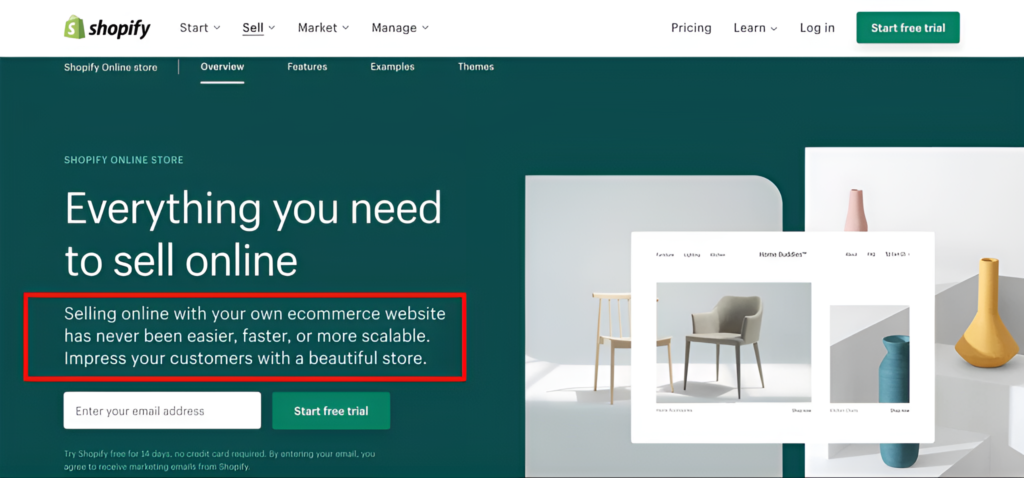
Overview
Shopify is a powerhouse for both novice and seasoned merchants, offering an intuitive interface coupled with a robust set of features tailored for online retail.
Key SEO Features
- Customizable H1, title, and meta tags
- Automated XML sitemap generation
- SEO-friendly product pages
Pros
- User-friendly interface
- Vast theme selection
- Extensive app marketplace
Cons
- Customization limitations due to proprietary coding language
- Additional transaction fees unless using Shopify Payments
Pricing Plans
- Basic: $29/month
- Shopify: $79/month
- Advanced: $299/month
BigCommerce
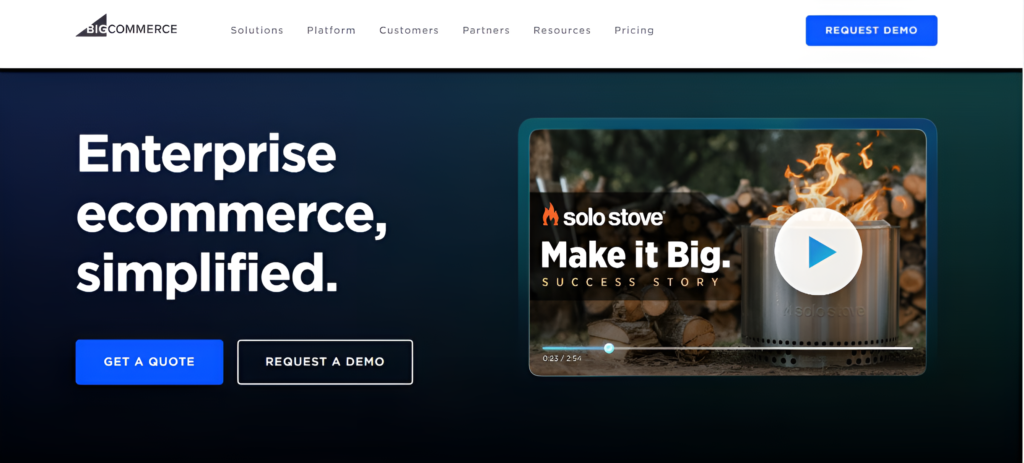
Overview
BigCommerce caters to businesses of all sizes, emphasizing scalability and comprehensive built-in features without the need for extensive plugins.
Key SEO Features
- SEO-friendly URLs and automatic sitemap updates
- Built-in blogging platform
- AMP (Accelerated Mobile Pages) support for product pages
Pros
- No transaction fees
- Advanced SEO features included in base plans
- Scalability for growth
Cons
- Steeper learning curve than some competitors
- Limited free theme options
Pricing Plans
- Standard: $29.95/month
- Plus: $79.95/month
- Pro: $299.95/month
WooCommerce
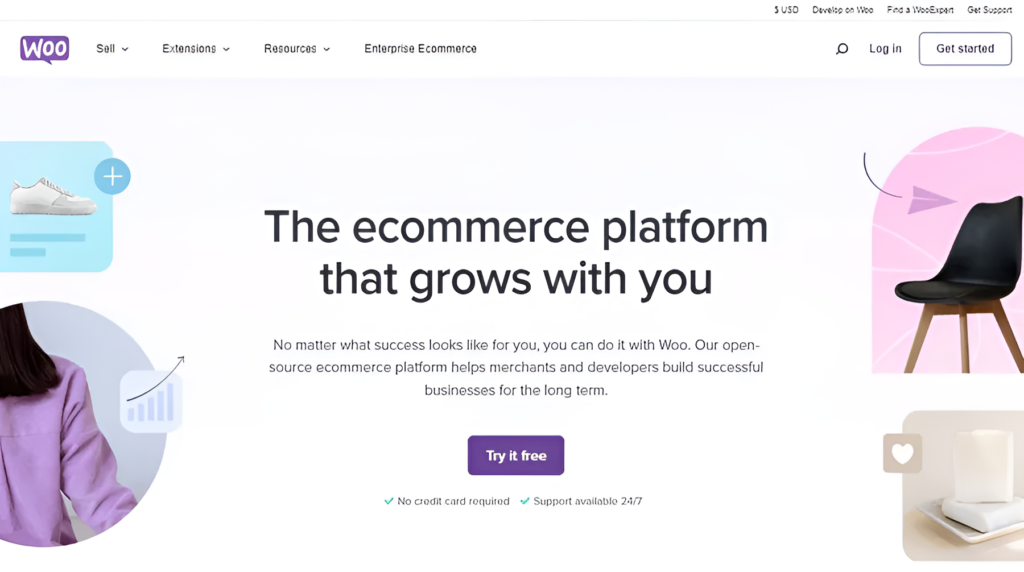
Overview
WooCommerce is a customizable, open-source eCommerce platform built on WordPress, offering unparalleled flexibility for website owners familiar with coding.
Key SEO Features
- Full control over HTML markup
- Integration with WordPress SEO plugins like Yoast SEO
- Customizable URLs and metadata
Pros
- Highly customizable for those with technical expertise
- Strong community support
- Free to install, with additional costs for hosting, themes, and plugins
Cons
- Requires manual updates and maintenance
- Hosting and security are self-managed
- Potentially higher costs due to needed extensions
Pricing Plans
- Free, with variable costs for web hosting, themes, and plugins. Hosting plans specifically optimized for WooCommerce start around $6.95/month.
Wix
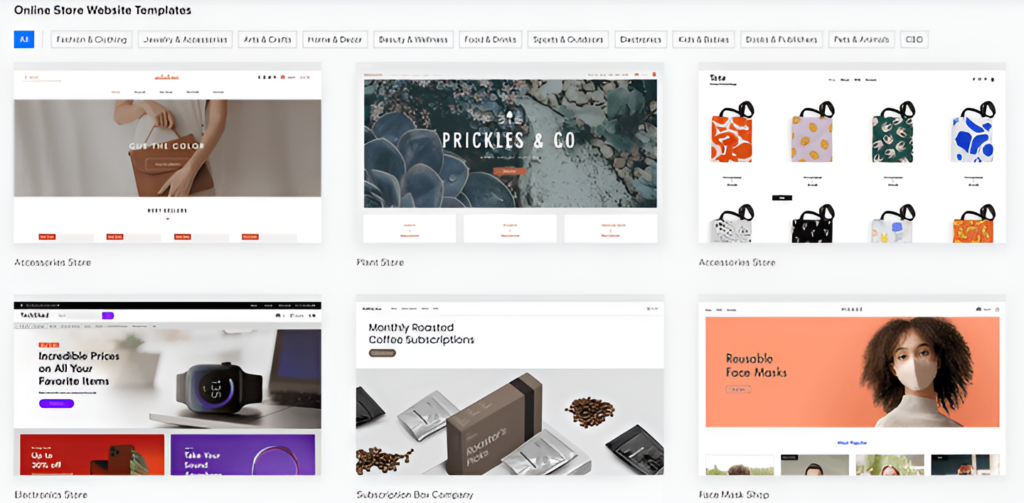
Overview
Wix is known for its drag-and-drop simplicity, making it a popular choice for small businesses and entrepreneurs looking for an easy-to-use platform.
Key SEO Features
- Mobile-friendly site templates
- Wix SEO Wiz for personalized SEO plans
- Easy-to-edit meta titles and descriptions
Pros
- Intuitive design interface
- Wide range of templates
- Includes hosting and security
Cons
- Less control over SEO compared to other platforms
- The site may load slower due to heavy design elements
- Limited eCommerce capabilities on lower-tier plans
Pricing Plans
- Business Basic: $23/month
- Business Unlimited: $27/month
- Business VIP: $49/month
Fathershops
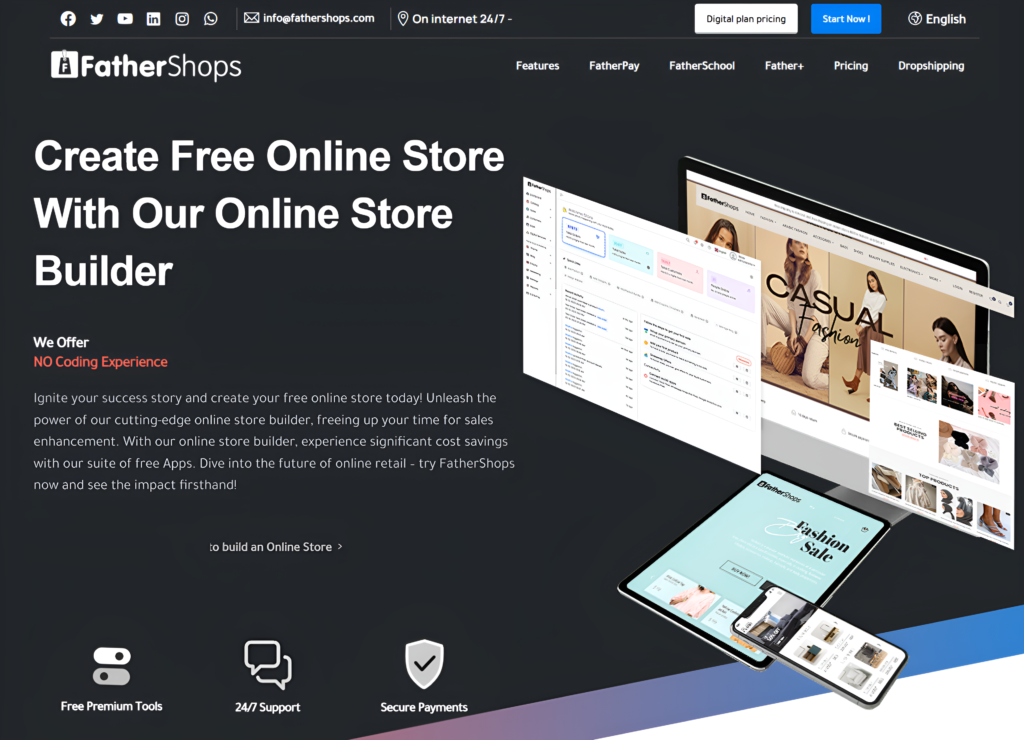
Overview
Fathershops is an emerging eCommerce platform designed for small to medium-sized businesses, focusing on ease of use and integrated SEO tools.
Key SEO Features
- Simplified SEO settings for beginners
- Integration with major SEO analytics tools
- Mobile optimization and responsive themes
Pros
- User-friendly for newcomers
- Affordable pricing structures
- Dedicated SEO support
Cons
- Limited customization options
- Smaller user community and fewer resources
- May lack advanced features for larger businesses
Pricing Plans
- Starter: $15/month
- Professional: $35/month
- Enterprise: Custom pricing
Squarespace
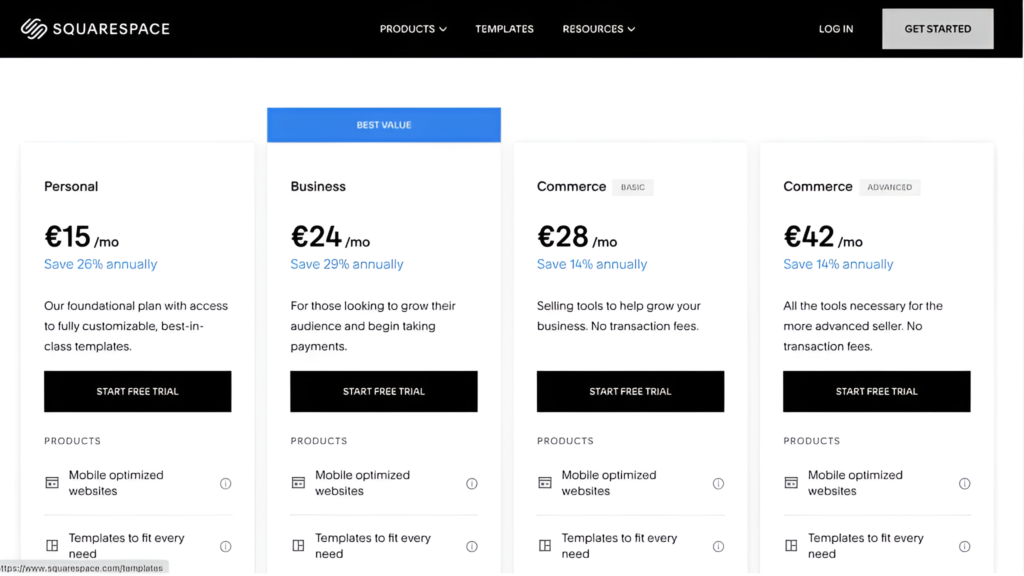
Overview
Squarespace is renowned for its stunning, design-forward website templates, making it a popular choice for businesses prioritizing aesthetics alongside functionality.
Key SEO Features
- Clean, SEO-friendly HTML markup
- Automatic mobile-optimization and sitemap generation
- Full control over page titles, meta descriptions, and custom URLs
Pros
- Exceptionally designed templates
- Integrated analytics and SEO tools
- Easy to use for beginners
Cons
- Limited third-party integrations
- Higher cost compared to other platforms with similar features
- Less flexibility for advanced customization
Pricing Plans
- Personal: $12/month
- Business: $18/month
- Basic Commerce: $26/month
- Advanced Commerce: $40/month
Selz
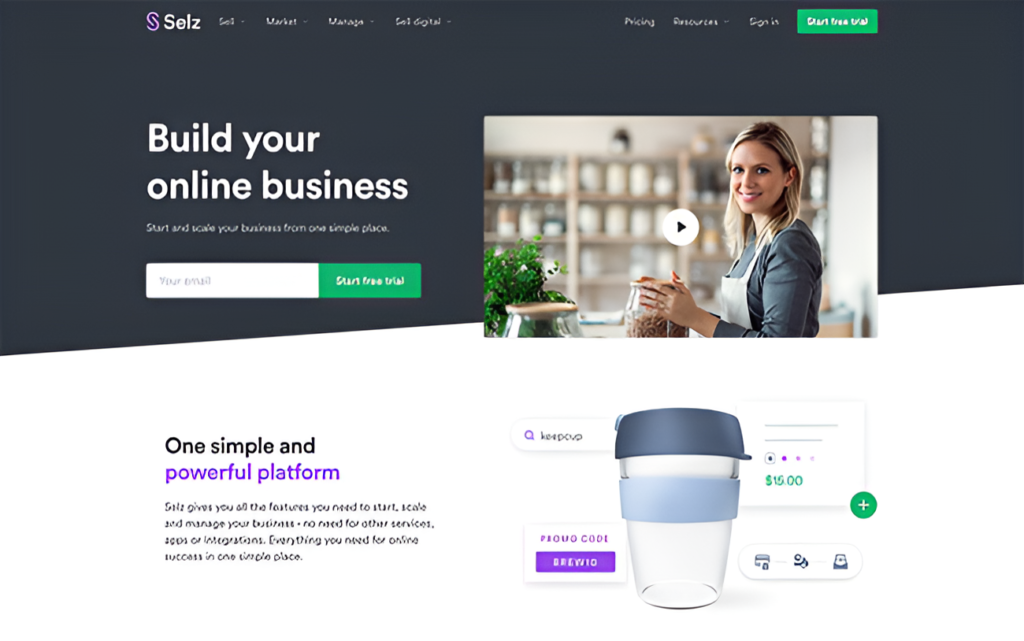
Overview
Selz is designed for entrepreneurs and small businesses, offering simple yet powerful tools to create online stores or sell products on existing websites.
Key SEO Features
- Easy editing of product page URLs, titles, and meta descriptions
- Integration with Google Analytics for tracking SEO performance
- Built-in blogging platform to support content marketing strategies
Pros
- User-friendly interface for beginners
- Direct sales through social media channels
- Comprehensive support and resources
Cons
- Limited customization options for more complex store setups
- Fewer app integrations compared to competitors
- Primarily suited for smaller scale operations
Pricing Plans
- Basic: $26/month
- Standard: $53/month
- Advanced: $179/month
Square Online
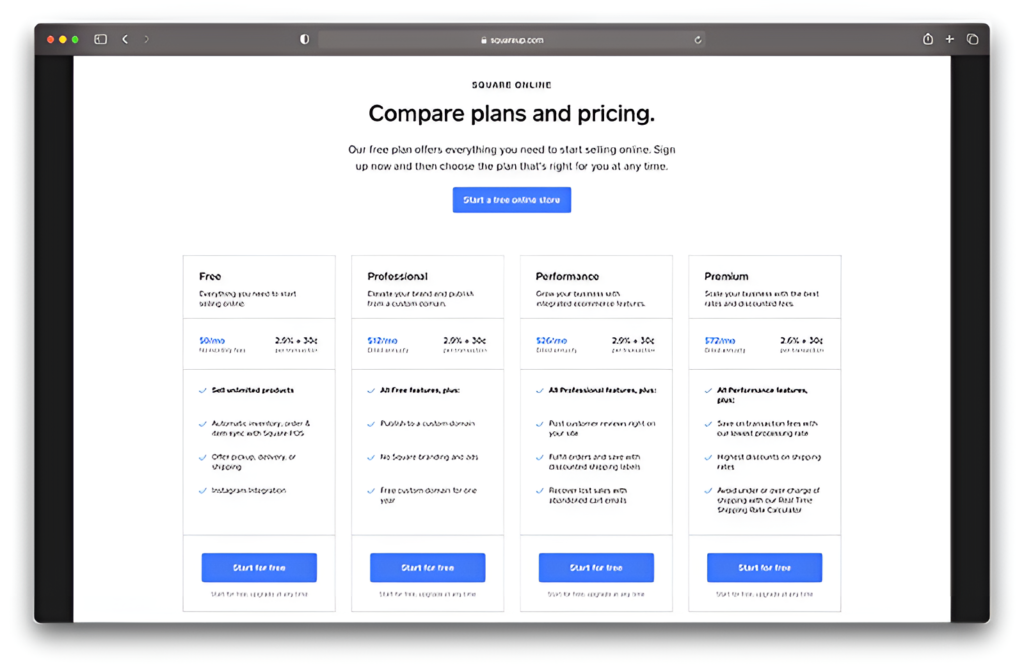
Overview
Square Online, powered by Weebly, offers a seamless solution for businesses to start selling online, especially for those already using Square’s point of sale system.
Key SEO Features
- Customizable URLs, titles, and meta descriptions for products and pages
- Automatic sitemap generation and mobile optimization
- Easy integration with Square POS for a unified inventory
Pros
- Free plan available with no monthly fees
- Straightforward setup and management
- Integrated eCommerce and physical sales systems
Cons
- Limited design flexibility and customization
- SEO tools may be too basic for advanced needs
- Ecommerce features are limited in the free plan
Pricing Plans
- Free
- Professional: $12/month
- Performance: $26/month
- Premium: $72/month
Ecwid
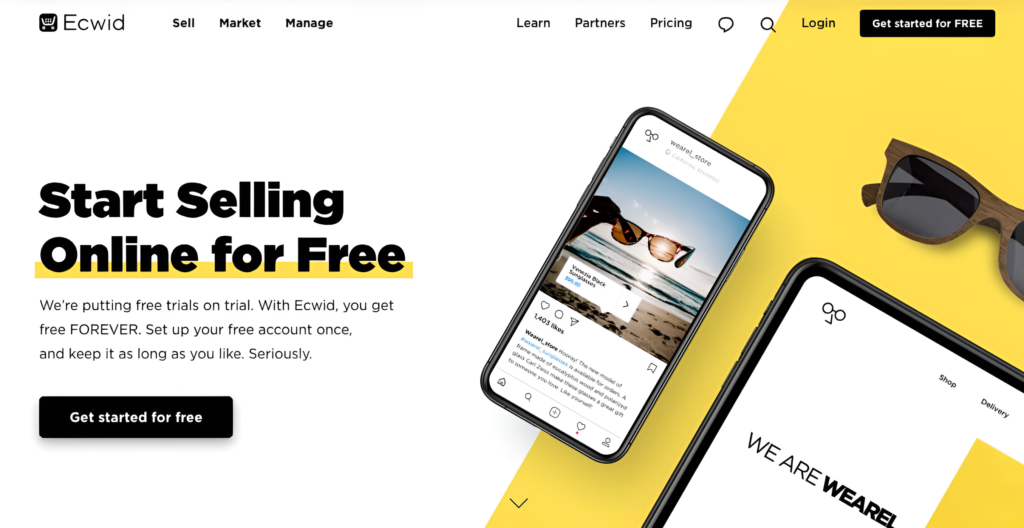
Overview
Ecwid is a versatile eCommerce solution that allows you to add a shopping cart to any website. It’s designed for ease of use and seamless integration across multiple platforms, including social media.
Key SEO Features
- SEO-friendly product URLs and automated sitemap generation
- Easy management of meta titles, descriptions, and product information for SEO
- Integration with social media platforms for enhanced visibility
Pros
- Highly flexible and can be integrated with existing websites
- Offers a free plan for basic use
- Simple setup and user-friendly interface
Cons
- More advanced features and customizations can require higher-tier plans
- Limited design options compared to standalone website builders
- Dependence on third-party platforms for certain integrations
Pricing Plans
- Free
- Venture: $15/month
- Business: $35/month
- Unlimited: $99/month
Weebly
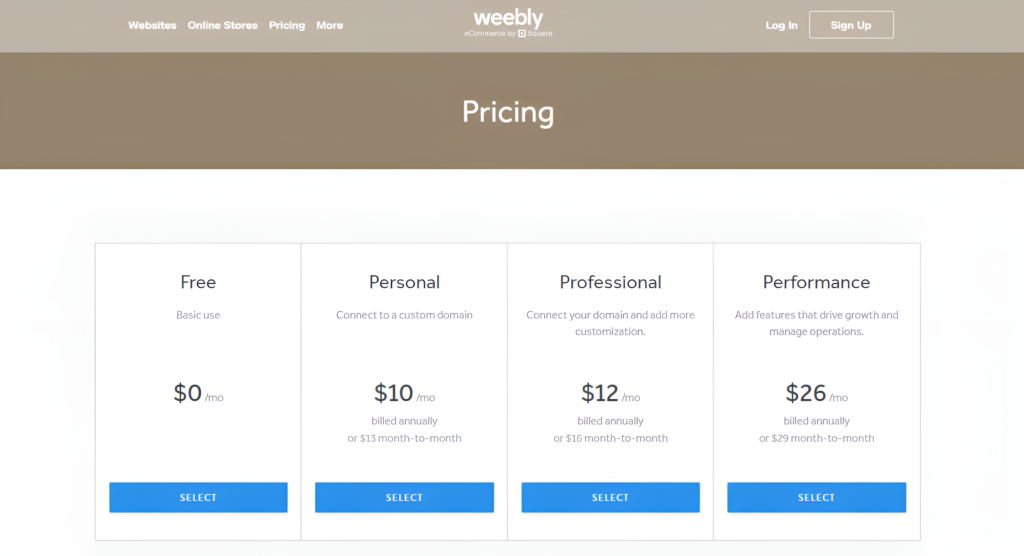
Overview
Weebly, now powered by Square, is a website builder known for its simplicity and drag-and-drop functionality, making it accessible for users of all skill levels.
Key SEO Features
- Customizable page titles, meta descriptions, and alt tags
- Mobile-optimized websites with responsive designs
- Integrated site performance tracking for SEO monitoring
Pros
- Intuitive drag-and-drop interface for easy site building
- Free plan available with basic eCommerce features
- Direct integration with Square for seamless payment processing
Cons
- SEO options may be too basic for advanced users
- Limited customization capabilities for more complex site designs
- Ecommerce features on the free plan are somewhat limited
Pricing Plans
- Free
- Personal: $6/month
- Professional: $12/month
- Performance: $26/month
Big Cartel
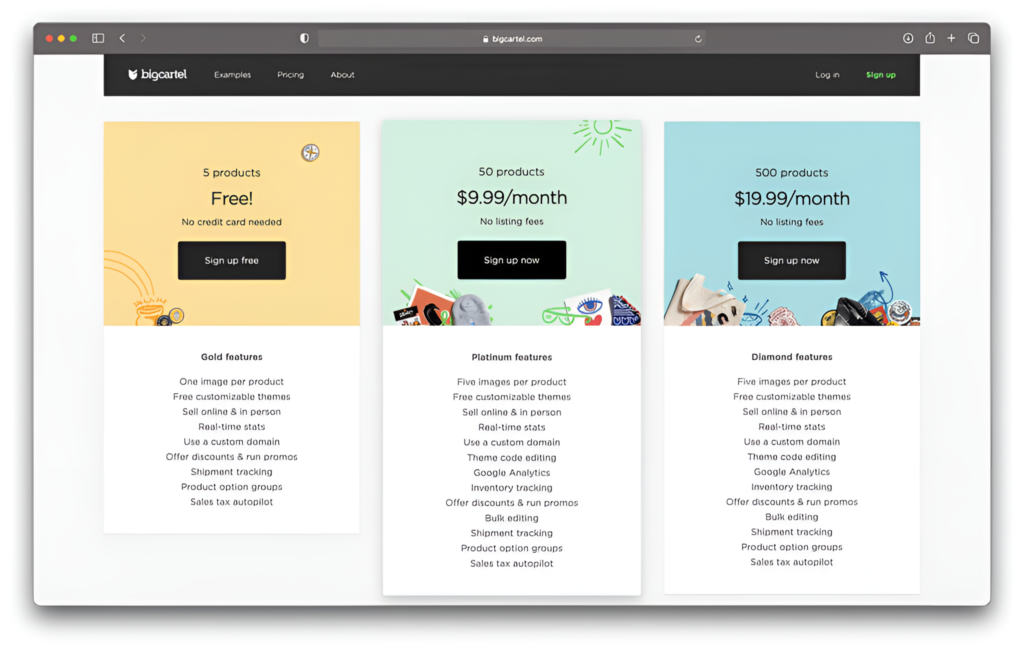
Overview
Big Cartel is specifically designed for artists and makers, offering straightforward tools to sell products without the complexity of larger platforms.
Key SEO Features
- Simple tools for editing page titles, descriptions, and product details
- Clean, mobile-friendly site designs
- Focus on unique URLs for individual products and pages
Pros
- Tailored for artists and indie sellers with emphasis on simplicity
- Affordable pricing, with a free plan for small shops
- Easy to set up and manage, even for beginners
Cons
- Limited features and integrations for scaling larger businesses
- Basic SEO and analytics capabilities
- Design and customization options are somewhat restricted
Pricing Plans
- Free for up to 5 products
- Platinum: $9.99/month for up to 50 products
- Diamond: $19.99/month for up to 500 products
Sellfy
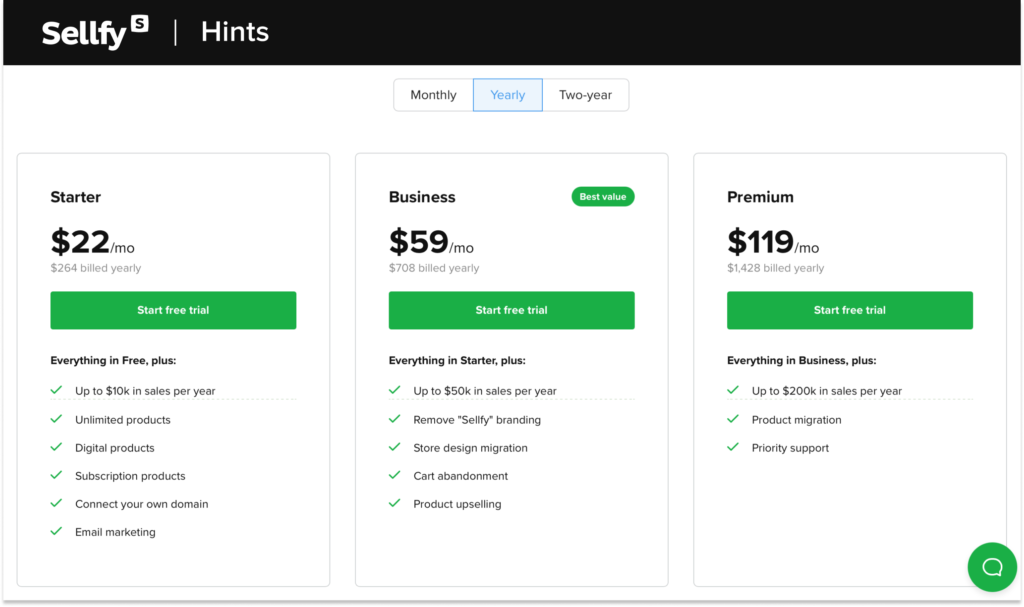
Overview
Sellfy serves digital content creators and merchants, offering a platform that specializes in the sale of digital products, subscriptions, and physical goods, with a focus on simplicity and ease of use.
Key SEO Features
- Simple customization of store URLs, meta titles, and descriptions
- Mobile-optimized storefronts
- Embedded SEO tools for content such as videos and PDFs
Pros
- Specifically designed for digital product sales
- Easy to set up and use, with minimal configuration required
- Direct integration for selling on social media platforms
Cons
- Limited customization options for the storefront
- Fewer features for physical product sales compared to other platforms
- Basic analytics and SEO tools may not meet the needs of larger businesses
Pricing Plans
- Starter: $19/month
- Business: $39/month
- Premium: $89/month
Joomla
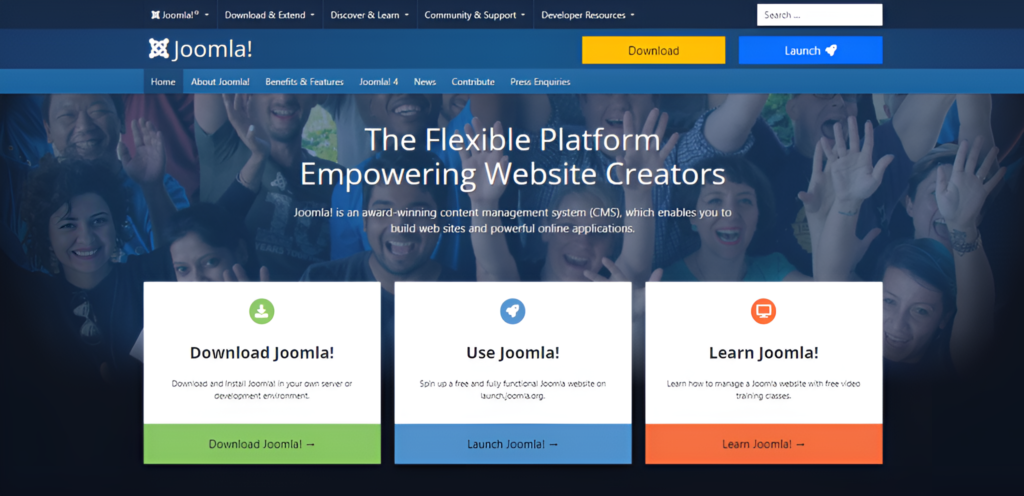
Overview
Joomla is an open-source content management system (CMS) known for its flexibility and extensive customization options, making it suitable for a wide range of websites, including complex eCommerce sites.
Key SEO Features
- Advanced SEO settings accessible through extensions and plugins
- Full control over URLs, meta titles, and descriptions
- Integrated capabilities for mobile optimization and responsive design
Pros
- Highly customizable with a vast extension directory
- Strong community support with numerous templates and tutorials
- Good for creating complex websites beyond simple eCommerce stores
Cons
- Steeper learning curve compared to other CMS platforms
- Maintenance and security require active management
- Some SEO and eCommerce capabilities depend on third-party extensions
Pricing Plans
Joomla itself is free, but costs can arise from web hosting, professional templates, and extensions necessary for eCommerce functionality.
AbanteCart
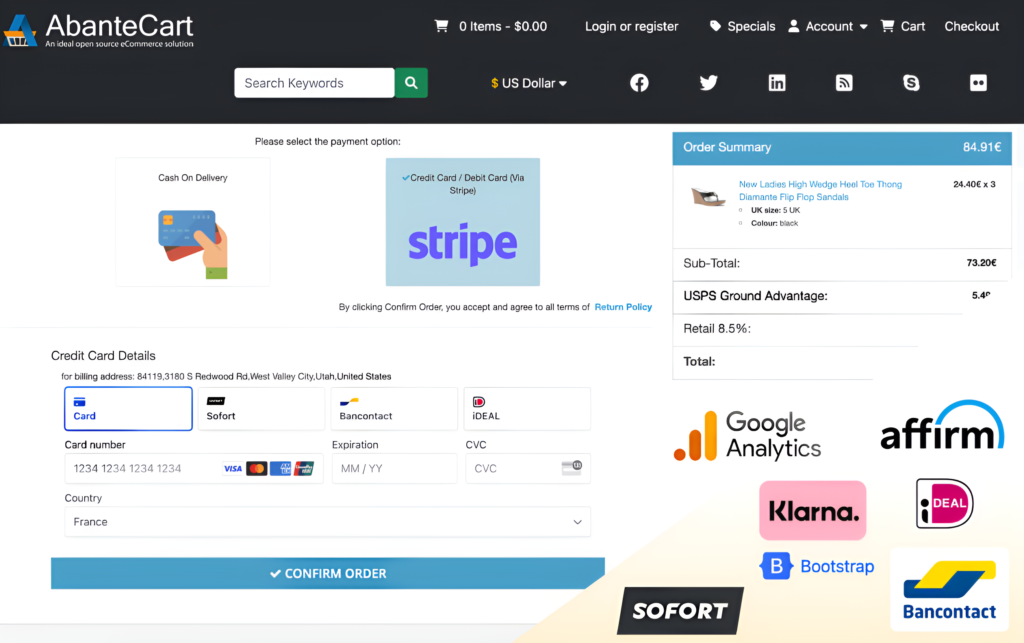
Overview
AbanteCart is a free, open-source eCommerce solution designed for small to medium-sized businesses, offering a range of out-of-the-box features for online retail.
Key SEO Features
- Easy management of meta data for products and categories
- Automatic generation of SEO-friendly URLs
- Responsive design for mobile optimization
Pros
- No initial cost, making it accessible for startups and small businesses
- User-friendly interface for non-technical users
- Extensive marketplace for additional features and integrations
Cons
- Limited design templates available out of the box
- Performance can vary depending on hosting solution
- Some features and extensions may require additional fees
Pricing Plans
AbanteCart is free to use, but additional costs may include hosting, premium templates, and extensions.
Volusion
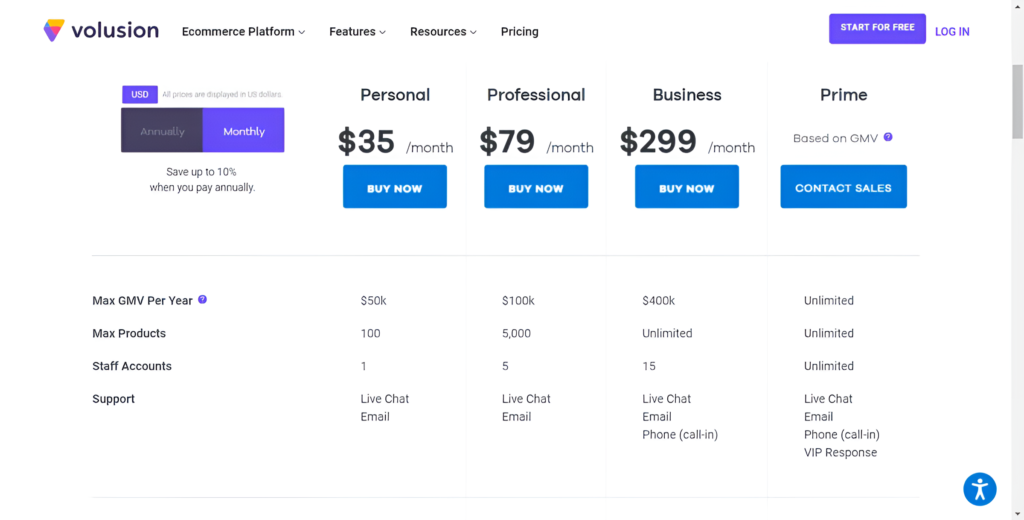
Overview
Volusion is an all-in-one eCommerce solution that focuses on providing businesses with the tools they need to build, manage, and expand their online store. Known for its robust functionality and ease of use, Volusion caters to small to medium-sized businesses looking to grow their online presence.
Key SEO Features
- Customizable URLs, title tags, and meta descriptions for products and pages
- Built-in sitemap generator for easier navigation by search engines
- Integration with social media and marketing tools to enhance SEO efforts
Pros
- Comprehensive set of built-in features without the need for many plugins
- Intuitive dashboard and user interface for easy store management
- Strong customer support and resources for merchants
Cons
- Limited third-party integrations compared to competitors
- Some users may find the theme customization options restrictive
- Higher pricing plans can be costly for startups and smaller businesses
Pricing Plans
- Personal: $29/month
- Professional: $79/month
- Business: $299/month
- Prime: Custom pricing based on the business needs
Choosing the Right eCommerce Platform for Your Business
Based on the comprehensive analysis of the top eCommerce platforms for SEO in 2024, the “best” platform varies significantly depending on individual business needs and goals. For small businesses or those just starting out, Shopify and Squarespace offer a blend of simplicity, aesthetic appeal, and SEO capabilities that can be very appealing.
Mid-size businesses looking for growth might turn to BigCommerce or WooCommerce for their scalability and extensive SEO features. Meanwhile, businesses with a strong focus on digital products might find specialized platforms like Sellfy more aligned with their needs.
Conclusion
In our journey through the top eCommerce platforms for SEO in 2024, we’ve explored a range of options, each with its unique strengths and features designed to boost online visibility. From Shopify’s user-friendly interface and robust SEO tools to WooCommerce’s flexibility and integration capabilities, and BigCommerce’s scalability and comprehensive SEO features, these platforms stand out as frontrunners for businesses aiming to optimize their online presence.
As we conclude, the final recommendation for businesses looking to enhance their eCommerce platform for SEO revolves around understanding their specific needs, audience, and growth objectives. For startups and small businesses, WooCommerce offers a cost-effective, customizable solution, while Shopify and BigCommerce are ideal for those seeking a balance between ease of use and advanced SEO capabilities.
Frequently-Asked Questions (FAQS)
What makes an eCommerce platform SEO-friendly?
An SEO-friendly eCommerce platform offers features like customizable URLs, meta tags editing, mobile optimization, fast load times, and easy integration with SEO tools and analytics, which are crucial for improving a website’s visibility and ranking on search engines.
Can changing my eCommerce platform improve my SEO?
Yes, switching to a more SEO-optimized eCommerce platform can improve your site’s search engine rankings by offering better site speed, mobile optimization, and other SEO tools. However, the transition must be handled carefully to avoid losing existing SEO equity.
How important is mobile optimization for eCommerce SEO?
With the increasing prevalence of mobile shopping and Google’s mobile-first indexing, mobile optimization is crucial for eCommerce SEO. It not only affects user experience but also directly impacts your site’s search engine rankings.
Are there eCommerce platforms suitable for businesses not experienced with SEO?
Yes, platforms like Wix and Squarespace are designed with beginners in mind, offering user-friendly interfaces, guided SEO settings, and built-in tools to help users implement basic SEO practices without prior experience.
How often should I review my eCommerce platform’s SEO capabilities?
SEO trends and algorithms change frequently, so it’s recommended to review your eCommerce platform’s SEO features at least once a year. This ensures your platform stays updated with the latest SEO best practices and technologies.


